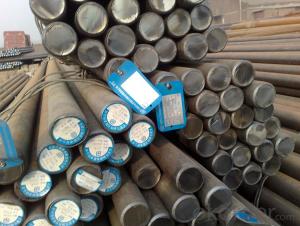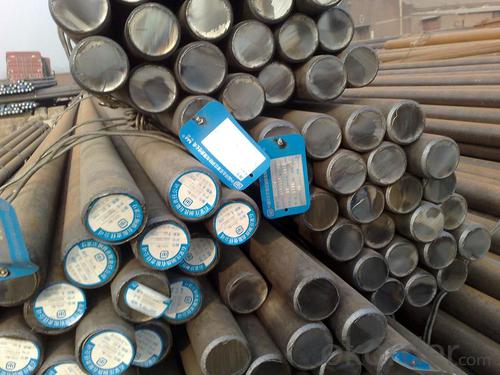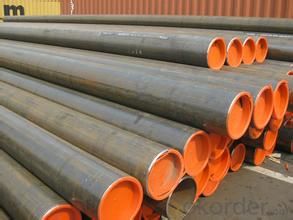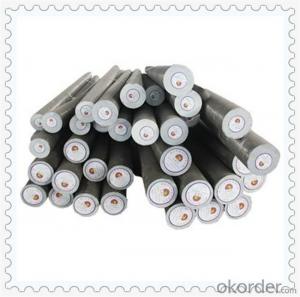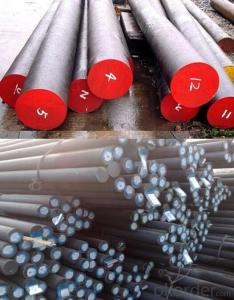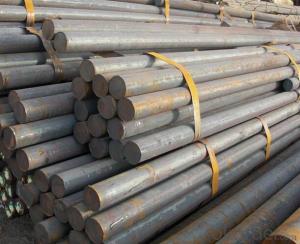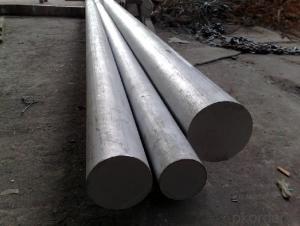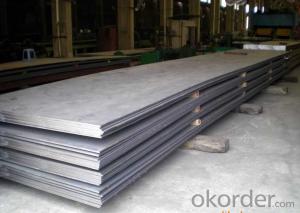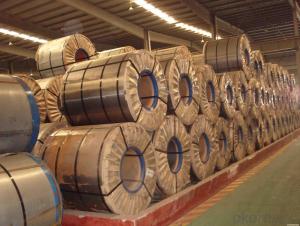Special Steel 1.6511 Alloy Structural Steel / 4340 Tool Steel
- Loading Port:
- China main port
- Payment Terms:
- TT or LC
- Min Order Qty:
- 25 m.t.
- Supply Capability:
- 10000 m.t./month
OKorder Service Pledge
OKorder Financial Service
You Might Also Like
Specification
The details of our Steel
1. Produce Standard: as the GB, AISI, ASTM, SAE, EN, BS, DIN, JIS Industry Standard
2. Produce processes: Smelt Iron -EAF smelt Billet - ESR smelt Billet -Hot rolled or forged get the steel round bar and plate
3. Heat treatment:
Normalized / Annealed / Quenched+Tempered
4. Quality assurance:
All order we can received Third party inspection, You can let SGS, BV,.. and others test company test and inspect our products before Goods shipping.
Product information
Chemical Composition(%) of 4340 tool steel | C | Si | Mn | S | P | Cr | Mo |
0.38-0.43 | ≤0.40 | 0.60-0.80 | ≤0.040 | ≤0.035 | 0.90-1.20 | 0.15-0.30 | |
Available Size of 4340 tool steel | Diameter(mm) | Length(mm) | |||||
10-300 | 2000-6000 | ||||||
Characteristics of 4340 tool steel | 1.high hardness 2.high tensile | ||||||
Application of 4340 tool steel | extrusion dies and die-casting for alumium, mandgnesium allay mostly, for copper alloy could use mechaincal press forhing of steel | ||||||
Heat Treatment of 4340 tool steel | 1. Forging:Heat slowly and uniformly to 1000°C. After forging cool slowly. 2. Annealing: 780-800°C slowly cooling | ||||||
Main product
Plastic Mould Steel
DIN 1.2311,1.2738,1.2083,1.2316 etc.
AISI P20,P20+Ni,420 etc.
JIS SUS420J2
Hot Work Steel
DIN 1.2344,1.2343,1.2367,1.2365,1.2581,1.2713 etc.
AISI H13,H11,H10,H21, etc.
JIS SKD61,SKD6,SKD5,SKT4 etc.
Cold Work Steel
DIN 1.2739, 1.2601, 1.2080, 1.2436, 1.2631, 1.263, 1.2510, 1.2327 etc.
AISI D2, D5, D3, D6, A8, A2, O1 etc.
JIS SKD10, SKD11, SKD1, SKS3 etc.
High Speed Steel
DIN 1.3343, 1.3243, 1.3247, 1.3355 etc.
AISI M2, M35, M42, T1 etc.
JIS SKH51, SKH35, SKH59, SKH2 etc.
Alloy Structural Steel
DIN 1.7035,1.6511,1.7220,1.7225 etc.
AISI 5140, 4340, 4135, 4140 etc.
JIS SCr440,SNCM439,SCM435,SCM440 etc.
Stainless & Carbon Steel or Others
DIN 1.4125,1.1191 etc
AISI 440C,1045, 1020 etc.
JIS SUS440C,S45C etc
Product show

Workshop show

Shipping
1. FedEx/DHL/UPS/TNT for samples, Door-to-Door;
2. By Air or by Sea for batch goods, for FCL; Airport/ Port receiving;
3. Customers specifying freight forwarders or negotiable shipping methods!
Delivery Time: 3-7 days for samples; 5-25 days for batch goods.
Payment Terms
1.Payment: T/T, L/C, Western Union, MoneyGram,PayPal; 30% deposits; 70% balance before delivery.
2.MOQ: 1pcs
3.Warranty : 3 years
4.Package Informations: 1) EXPORT, In 20 feet (GW 25 ton) or 40 feet Container (GW 25 ton)
2)as customer's requirement
Why choose us?
(1) The leading exporter in China special steel industry.
(2) Large stocks for various sizes, fast delivery date.
(3) Good business relationship with China famous factories.
(4) More than 7 years steel exporting experience.
(5) Good after-sales service guarantee.
- Q: What are the different methods of surface finishing for special steel?
- Special steel can be finished using various methods, each with its own advantages and the ability to meet specific aesthetic or functional needs. Some commonly utilized techniques include: 1. Electroplating: Through an electrochemical reaction, a layer of metal is deposited onto the surface of the special steel. This process enhances corrosion resistance, improves appearance, and can increase hardness or wear resistance. 2. Passivation: A chemical treatment is employed to eliminate surface contaminants and form a thin oxide layer on the special steel. This treatment enhances corrosion resistance by preventing rust or other oxidation products from forming. 3. Polishing: Utilizing abrasive materials, a mechanical process is employed to remove a thin layer of the steel surface, resulting in a smooth and glossy finish. This method is often used to enhance the appearance of special steel products or achieve a desired level of reflectivity. 4. Shot blasting: Tiny metal beads or shots are propelled at high speeds onto the surface of the special steel. This technique removes scale, rust, or other surface contaminants, resulting in a clean and textured finish. Shot blasting is commonly employed to prepare the steel for subsequent coating or painting applications. 5. Physical vapor deposition (PVD): A vacuum-based coating process is used to deposit a thin layer of material onto the special steel surface. This method offers excellent adhesion, wear resistance, and the ability to provide various colors or finishes to enhance the steel's aesthetics. 6. Powder coating: Dry powder is applied onto the special steel surface and then cured under heat to form a protective and decorative layer. This method offers excellent corrosion resistance, durability, and a wide range of color options. 7. Anodizing: An electrolytic process is employed to create a controlled oxide layer on the surface of specific special steel alloys. This process increases corrosion resistance, improves appearance, and can enhance hardness or wear resistance. These methods are just a selection of the numerous options available for surface finishing special steel. The choice of method will depend on factors such as the desired finish, functional requirements, and the specific properties of the steel being used.
- Q: How is special steel tested for quality?
- Special steel is tested for quality through various processes such as chemical analysis, mechanical testing, and non-destructive testing. Chemical analysis involves checking the composition and purity of the steel to ensure it meets the required specifications. Mechanical testing includes assessing the strength, hardness, and toughness of the steel through methods like tensile testing, impact testing, and hardness testing. Non-destructive testing techniques like ultrasonic testing, magnetic particle inspection, and radiographic testing are employed to detect any defects or irregularities within the steel without causing any damage. These comprehensive tests ensure that special steel meets the necessary quality standards before it is used in various industries.
- Q: How does special steel perform in terms of corrosion resistance?
- Special steel performs exceptionally well in terms of corrosion resistance. It is specifically designed and engineered to have enhanced resistance against corrosion compared to standard steel. This is achieved through various alloying elements and specific heat treatment processes that create a protective barrier against corrosive elements such as moisture, chemicals, and atmospheric conditions. As a result, special steel exhibits excellent durability and longevity even in corrosive environments, making it a preferred choice in industries where corrosion resistance is crucial, such as marine, oil and gas, and chemical industries.
- Q: What are the different mining grades of special steel?
- Special steel is a term used to describe steel alloys that are specially designed for applications that require exceptional strength, durability, corrosion resistance, or other unique properties. The mining industry heavily relies on special steel for various components, tools, and equipment used in mining operations. There are several types of special steel grades specifically tailored for mining purposes, each possessing its own distinct properties and characteristics. These grades are typically classified based on their chemical composition, mechanical properties, and intended use in mining applications. Some common examples of special steel grades used in mining are: 1. High-strength Low Alloy (HSLA) Steel: HSLA steel is renowned for its remarkable strength and toughness, making it perfect for heavy-duty mining machinery and equipment. It offers exceptional weldability and corrosion resistance, which is crucial in harsh mining environments. 2. Stainless Steel: Stainless steel is extensively utilized in mining due to its superb resistance to corrosion and ability to withstand high temperatures. It is commonly employed in mining equipment such as pipes, fittings, and tanks, where resistance to corrosion and abrasion is of utmost importance. 3. Tool Steel: Tool steel is specifically engineered for cutting, drilling, and shaping tools used in mining operations. It possesses high hardness, wear resistance, and toughness, making it suitable for demanding applications like drilling bits, hammers, and cutting tools. 4. Wear-resistant Steel: Wear-resistant steel is specially designed to withstand abrasive conditions and minimize wear and tear in mining equipment. It is commonly employed in mining buckets, conveyor belts, and crushers to extend their service life and reduce maintenance. 5. Heat-resistant Steel: Heat-resistant steel is essential for mining applications involving high temperatures, such as smelting and refining processes. It retains its strength and structural integrity even at elevated temperatures, reducing the risk of equipment failure and ensuring operational efficiency. 6. Corrosion-resistant Steel: Corrosion-resistant steel finds extensive use in mining operations where exposure to corrosive substances like acids or seawater is common. It prevents rusting and degradation, thereby prolonging the lifespan of mining equipment and structures. It is important to note that the specific special steel grades used in mining may vary depending on the manufacturer and the intended use. To ensure optimal performance and suitability for mining applications, it is advisable to consult with steel manufacturers or industry experts who can provide guidance on selecting the appropriate grade for specific mining requirements.
- Q: How is special steel recycled?
- Special steel is typically recycled through a process called electric arc furnace (EAF) steelmaking. During this process, scrap steel, including special steel, is melted down in an electric arc furnace. The furnace reaches extremely high temperatures, causing the steel to melt. Once melted, the impurities are removed, and the steel is then refined and shaped into new products. This recycling method helps to conserve natural resources, reduce energy consumption, and minimize environmental impacts associated with traditional steel production.
- Q: What are the advantages of using special steel in construction?
- There are several advantages of using special steel in construction. Firstly, special steel offers superior strength and durability, making it ideal for high-rise buildings and structures that require enhanced structural integrity. Additionally, special steel has excellent corrosion resistance properties, which significantly increases the lifespan of a structure, especially in harsh environments. Furthermore, special steel can be customized and fabricated into various shapes, allowing for flexible and innovative architectural designs. Lastly, special steel is a sustainable and eco-friendly material, as it is recyclable and reduces the need for new resources, thereby contributing to a more sustainable construction industry.
- Q: Can special steel be used for making aerospace components?
- Yes, special steel can be used for making aerospace components. Special steel, also known as aerospace steel or aircraft steel, is specifically designed to meet the high demands and stringent requirements of the aerospace industry. It possesses exceptional strength, durability, and heat resistance properties, which are crucial for withstanding the extreme conditions experienced by aircraft components during flight. Aerospace components, such as landing gear, engine parts, fasteners, and structural elements, often require materials that can maintain their integrity under high temperatures, stress, and corrosive environments. Special steel alloys are developed to have excellent mechanical properties, including high tensile strength, fracture toughness, and resistance to fatigue, creep, and corrosion. These properties make them suitable for critical aerospace applications where safety and reliability are of utmost importance. Furthermore, special steel can be tailored to specific requirements, such as weight reduction, improved fuel efficiency, and enhanced performance. Through advanced alloying techniques and heat treatments, aerospace steel can be engineered to have desirable characteristics like increased hardness, wear resistance, and dimensional stability. This allows for the production of lighter and more efficient aerospace components without compromising on strength or safety. In conclusion, special steel is a preferred material for making aerospace components due to its exceptional mechanical properties, heat resistance, and corrosion resistance. Its ability to withstand extreme conditions and be customized to specific requirements makes it an ideal choice for manufacturing critical parts used in the aerospace industry.
- Q: What is the role of alloying elements in special steel?
- The role of alloying elements in special steel is to enhance its properties, such as strength, hardness, corrosion resistance, and heat resistance. These elements are added to the steel during the manufacturing process to create alloys with specific characteristics required for various applications. Alloying elements can alter the microstructure of the steel, improving its performance and making it suitable for specialized uses in industries like aerospace, automotive, construction, and oil and gas.
- Q: How are copper alloys used in electrical applications?
- Copper alloys are extensively used in electrical applications due to their excellent electrical conductivity and thermal properties. They are used in the production of electrical wires, connectors, and busbars, ensuring efficient transmission of electricity. Copper alloys also offer good corrosion resistance, making them suitable for outdoor and marine electrical systems. Additionally, their high strength and ductility allow for easy fabrication and installation in various electrical components.
- Q: Can special steel be used in the production of musical instruments?
- Yes, special steel can be used in the production of musical instruments. It is commonly used for strings, guitar frets, and some wind instrument components due to its specific acoustic properties and durability.
Send your message to us
Special Steel 1.6511 Alloy Structural Steel / 4340 Tool Steel
- Loading Port:
- China main port
- Payment Terms:
- TT or LC
- Min Order Qty:
- 25 m.t.
- Supply Capability:
- 10000 m.t./month
OKorder Service Pledge
OKorder Financial Service
Similar products
Hot products
Hot Searches
Related keywords
